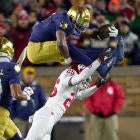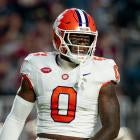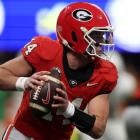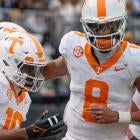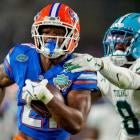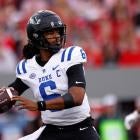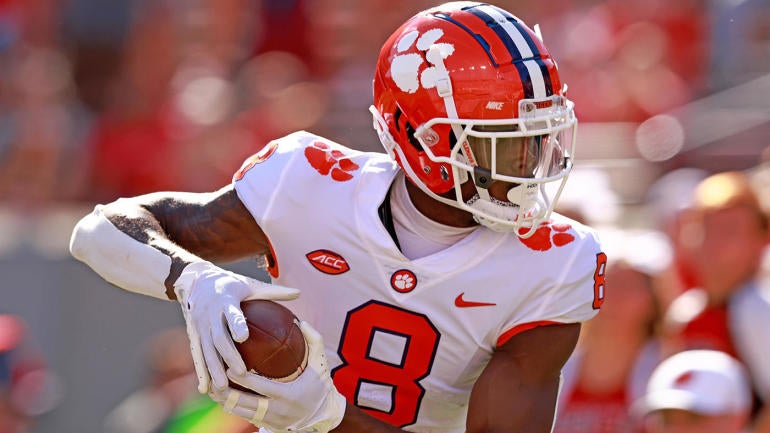
After every draft in every professional sport that utilizes a collegiate feeder system, it's easy to look back with the 20-20 vision of hindsight and identify early entrants who would have benefitted from staying in college another season. The same goes for the 2022 NFL Draft, except this season there is an added wrinkle to the equation because of how name, image and likeness is changing college sports.
While back-room deals and bag drops have long been part of college football's seedy underbelly, the amount of money available to star players now is increasing rapidly as we enter a new world for the sport. No longer is the NFL the only place to legally make life-changing money playing football, as the NCAA takes a hands-off approach to policing the NIL game.
Playing college football in this era is going to be more lucrative for some players than moving on and fighting for an NFL roster spot. While early-round draft picks at the pro level still live in a unique financial stratosphere, the lack of guaranteed money available to late-round draft picks should give some college juniors something to think about as they ponder decisions about their futures.
For most young football players, reaching the NFL is the ultimate dream, and fulfilling that goal may transcend a simple financial equation. But for some juniors from the 2022 draft class, it seems the benefits of playing a final college season might have outweighed the benefits of moving on. Here are five juniors from the 2022 draft class who may have been in position to cash in via NIL but will now be fighting for their proverbial lives in the NFL instead.
The players below are ranked in order of how poorly things played out for them during the draft relative to pre-draft expectations and hopes.
1. Justyn Ross, Clemson WR
Undrafted
Ross ranked as the No. 17 receiver and No. 123 overall player in the CBS Sports NFL Draft positional rankings, which should have translated to a mid-round selection. Instead, Ross went down as one of the biggest snubs of the draft. Ultimately, it's hard to knock Ross for staying in the draft. The projections were there, he was at Clemson for four years and the knee injury that forced him to miss the 2020 season as a medical redshirt likely only increased his sense of urgency to take the quickest path available to the NFL.
His 46 catches for 514 yards as the featured weapon in a scuffling Clemson passing attack last season suggested that the 6-foot-4 target had recuperated well enough from the injury to have a nice professional career. In the end, he still could. But in hindsight, he also could have played one more season of college football. For as skeptical of college football's new frontier as Clemson coach Dabo Swinney is, the Tigers do have a budding NIL infrastructure, and Ross surely would have been a major beneficiary if he'd opted for a dramatic return.
2. Jalen Wydermyer, Texas A&M TE
Signed with Buffalo as undrafted free agent
Wydermyer established himself as one of college football's best tight ends during a three-year run at Texas A&M, and it was surprising to see him go undrafted. With Texas A&M's strong donor base and unabashed willingness to commit whatever resources necessary to on-field success, you've got to believe he could have leveraged an NIL deal with the Aggies that would bring more financial comfort than clawing for an NFL roster spot.
3. Sincere McCormick, UTSA RB
Signed with Seattle as undrafted free agent
It will always make sense for the elite few running backs who are going to be selected in the first or second round to make the NFL leap. After all, Najee Harris snagged more than $13 million guaranteed when he signed with the Steelers after getting selected No. 24 overall last year. But running backs at risk of slipping to the late rounds or into undrafted territory might be better off returning to a program where they are in line for big NIL money.
McCormick is a great example. He was an absolute stud at UTSA and would have been one of the most-coveted players in the transfer portal if he'd opted to transfer to a Power Five school instead of staying in the NFL Draft. The NIL opportunities available to him at a major college program -- or maybe even at UTSA -- would assuredly have been more lucrative financially than fighting it out for a roster spot as an undrafted free agent.
The longstanding train of thought with college running backs was that they should leave after their junior season if they were likely going to be drafteD, regardless of position, so that they could make some money while they still had tread on their tires. The longevity of running backs in the NFL is notoriously short, and the idea was that stars at the position should capitalize while healthy. It's shocking that McCormick wasn't drafted, and his case should be a cautionary tale for other star junior running backs in the NIL era. For many big-time college backs, there may be more guaranteed money available in college now than on the fringes of NFL life.
4. Kaleb Eleby, Western Michigan QB
Signed with Seattle as undrafted free agent
Eleby ranked as the No. 10 quarterback in the CBS Sports NFL Draft Prospect Rankings after an excellent three-year college career at Western Michigan, but will now be fighting for a roster spot in the pros. After tossing 41 touchdowns and just eight interceptions over the past two seasons with the Broncos, power conference teams with roaring NIL engines would likely have lined up for Eleby in the transfer portal. He could have made an excellent one-year, high six-figure rental for a first-year coach or coach on the hot seat.
5. Sam Howell, North Carolina QB
No. 1 in 5th round (No. 144 overall) to Washington Commanders
After setting North Carolina program records for career passing yards and touchdowns in three seasons, it's understandable that Howell is ready for the next chapter of his career. But he also would have been arguably the most recognizable player in the ACC if he'd returned for his senior season. As a historically great Tar Heels quarterback, Howell surely could have worked out a seven-figure NIL deal if he'd opted to play his senior season.
Salary data from quarterbacks selected in the fourth round (Ian Book in 2021) and fifth round (Jake Fromm in 2020) in the last two drafts suggest it's unlikely that Howell will be guaranteed $1 million on his rookie contract. It's not as if Howell made a poor choice, but if he'd had a burning desire to play another season of college football, it probably could have been a reasonable financial move if his camp had pushed the envelope on his NIL value.








